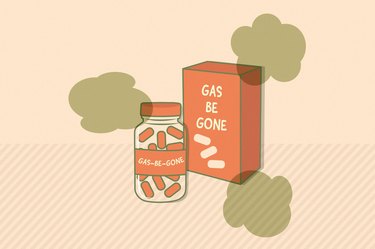
If you're faced with excessive flatulence, popping an over-the-counter anti-gas pill is an easy way to keep a case of tummy rumbles in check. But what happens if you're taking the meds every day?
Products like Gas-X, Gas Aide, Mylicon, Maalox Gas and others are designed to ease gassiness along with symptoms like bloating, burping and pain or fullness. They all contain the anti-gas agent simethicone, a compound that disperses gas bubbles within the digestive tract to help the body pass them more easily, explains Bharat Pothuri, MD, a gastroenterologist with Memorial Hermann hospital in Houston, Texas.
Video of the Day
Video of the Day
Simethicone doesn't have any serious side effects, per the U.S. National Library of Medicine (NLM). It's also not absorbed systemically and won't build up in your body over time — in other words, whatever medication your body doesn't use just gets pooped out.
In short, it's a safe medication, and one that won't harm you if you take it frequently, Dr. Pothuri says. Even so, it's not necessarily the best idea to pop simethicone pills like candy every day, she says.
The Problem With Taking Anti-Gas Pills Every Day
If you're dealing with gas, it's typically recommended to take 40 to 125 milligrams of simethicone four times daily as needed, after meals and at bedtime, according to the NLM. But keep in mind that the drug does not treat the underlying cause of excessive gas.
In other words, taking simethicone for an occasional case of gas or bloating is perfectly fine. But if you're using it to fight flatulence every day, that could mean you have a larger GI problem that needs to be addressed.
"Gas is a very common symptom seen in patients with irritable bowel syndrome," Dr. Pothuri says.
You might also have trouble digesting particular foods or enzymes, like lactose (found in milk and dairy products) or gluten (found in wheat, rye and barley). Some people with excessive gas also have issues with foods containing FODMAPs, a type of hard-to-digest sugar found in certain fruits and vegetables.
Sometimes these underlying culprits can be severe. Inflammatory bowel diseases like Crohn's disease and ulcerative colitis, vascular disease of the gut, motility disorders of the stomach or intestines, celiac disease, pancreatic insufficiency, small intestinal bacterial overgrowth (SIBO) and even some GI cancers can all cause an increase in gas along with other GI symptoms, Dr. Pothuri says.
What to Do Instead of Taking Anti-Gas Pills Daily
Rather than rely on simethicone to tame your tummy troubles every day, see your doctor or a gastroenterologist to find out what could be causing your gas.
"There may be an underlying treatable cause," Dr. Pothuri says.
If a thorough GI exam gives you a clean bill of health and you're still gassy, you can take steps to keep gas from becoming a problem in the first place, Dr. Pothuri says. According to the Mayo Clinic, you can try the following to prevent gas:
- Eat smaller, more frequent meals.
- Eat slowly and chew your food thoroughly.
- Avoid chewing gum, sucking on hard candies or drinking through a straw. All of these things can cause you to swallow more air and have more gas.
- Reduce your intake of fatty meals, which take longer to digest and can cause more gas. (You can add foods that help with bloating to your meals, too.)
- Cut back on carbonated beverages, which create gas bubbles in your stomach. (Try these drinks that ease gas and bloating instead.)
- Drink plenty of water, which can reduce gas by supporting regular bowel movements.
- Exercise regularly. Moving more helps release trapped gas in your GI tract.
So, How Bad Is It Really to Take Anti Gas Pills Every Day?
A daily dose of simethicone probably won't harm you. But needing to use it regularly could mean you have a GI problem that isn't being managed, so let your doctor know. Together, you can figure out what's going on to keep more gas at bay in the first place, so you don't need the meds to feel better.
Was this article helpful?
150 Characters Max
0/150
Thank you for sharing!
Thank you for your feedback!
Is this an emergency? If you are experiencing serious medical symptoms, please see the National Library of Medicine’s list of signs you need emergency medical attention or call 911.
